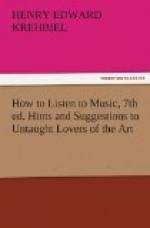"Questo e il fin di chi
fa mal:
E dei perfidi la morte
Alla vita e sempre ugual."
“New York Musical Season, 1889-90.”
[F] “Review of the New York Musical Season, 1889-90,” p. 75.
[G] See “Studies in the Wagnerian Drama,” chapter I.
VIII
Choirs and Choral Music
[Sidenote: Choirs a touchstone of culture.]
[Sidenote: The value of choir singing.]
No one would go far astray who should estimate the extent and sincerity of a community’s musical culture by the number of its chorus singers. Some years ago it was said that over three hundred cities and towns in Germany contained singing societies and orchestras devoted to the cultivation of choral music. In the United States, where there are comparatively a small number of instrumental musicians, there has been a wonderful development of singing societies within the last generation, and it is to this fact largely that the notable growth in the country’s knowledge and appreciation of high-class music is due. No amount of mere hearing and study can compare in influence with participation in musical performance. Music is an art which rests on love. It is beautiful sound vitalized by feeling, and it can only be grasped fully through man’s emotional nature. There is no quicker or surer way to get to the heart of a composition than by performing it, and since participation in chorus singing is of necessity unselfish and creative of sympathy, there is no better medium of musical culture than membership in a choir. It was because he realized this that Schumann gave the advice to all students of music: “Sing diligently in choirs; especially the middle voices, for this will make you musical.”
[Sidenote: Singing societies and orchestras.]
[Sidenote: Neither numbers nor wealth necessary.]
There is no community so small or so ill-conditioned that it cannot maintain a singing society. Before a city can give sustenance to even a small body of instrumentalists it must be large enough and rich enough to maintain a theatre from which those instrumentalists can derive their support. There can be no dependence upon amateurs, for people do not study the oboe, bassoon, trombone, or double-bass for amusement. Amateur violinists and amateur flautists there are in plenty, but not amateur clarinetists and French-horn players; but if the love for music exists in a community, a dozen families shall suffice to maintain a choral club. Large numbers are therefore not essential; neither is wealth. Some of the largest and finest choirs in the world flourish among the Welsh miners in the United States and Wales, fostered by a native love for the art and the national institution called Eisteddfod.




